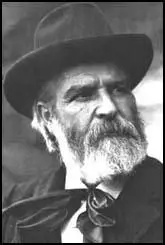Edwin Markham

Edwin Markham, the youngest of ten children, was born in Oregon City on 23rd April, 1852. When he was a child his family moved to California. Markham attended rural schools before finding work as a farm labourer.
In 1868 he entered California College and after graduating four years later, became a teacher at San Luis. This was followed by periods in Santa Rosa and Coloma before being appointed headteacher of a school in Hayward.
Markham also wrote poetry and his work was published in the Overland Monthly and Scribner's Magazine. In January 1899, he most famous poem, The Man with the Hoe, appeared in the San Francisco Examiner.
Markham's first collection of poems, The Man and the Hoe and Other Poems, appeared later that year. This was followed by further collections including Lincoln and Other Poems (1901), California the Wonderful (1915), Gates of Paradise (1920), Ballad of the Gallows Bird (1926), Eighty Poems at Eighty (1932) and Collected Poems (1940).
Markham's concern for the welfare of the underdog made him popular with radicals and Benjamin Flower described him as "democracy's greatest poet". Children of Bondage, a book that Markham wrote with Ben Lindsey, George Creel and Owen Lovejoy on the exploitation of young workers, is considered to have influenced the federal government's attempts to control child labour.
Edwin Markham died in 7th March, 1940.
Primary Sources
(1) Benjamin Flower, Progressive Men, Women and Movements (1914)
Edwin Markham, democracy's greatest poet, is the reflector of the mighty spiritual undercurrent of our age. He represents the new conscience and the broadening spiritual ideals of our wonderful age.
One of his most important recent works is entitled Children of Bondage. It is one of the most compelling and conscience-stirring volumes that our wonderful age has produced, dealing with the moral crime of child labour or the slavery of the little ones which dwarfs their physical, mental, and moral natures and robs them of the heritage that should be the right of every free-born child.
(2) Edwin Markham, Cosmopolitan (January, 1907)
In unaired rooms, mothers and fathers sew by day and by night. Those in the home sweatshop must work cheaper than those in the factory sweatshops.
And the children are called in from play to drive and drudge beside their elders.
All the year in New York and in other cities you may watch children radiating to and from such pitiful homes. Nearly any hour on the East Side of New York City you can see them - pallid boy or spindling girl - their faces dulled, their backs bent under a heavy load of garments piled on head and shoulders, the muscles of the whole frame in a long strain.
Is it not a cruel civilization that allows little hearts and little shoulders to strain under these grown-up responsibilities, while in the same city, a pet cur is jeweled and pampered and aired on a fine lady's velvet lap on the beautiful boulevards?
(3) Edwin Markham, The Man With a Hoe (1899)
The Man with a Hoe
Bowed by the weight of centuries he leans
Upon his hoe and gazes on the ground,
The emptiness of ages in his face,
And on his back, the burden of the world.
Who made him dead to rapture and despair,
A thing that grieves not and that never hopes,
Stolid and stunned, a brother to the ox?
Who loosened and let down this brutal jaw?
Whose was the hand that slanted back this brow?
Whose breath blew out the light within this brain?
Is this the Thing the Lord God made and gave
To have dominion over sea and land;
To trace the stars and search the heavens for power;
To feel the passion of Eternity?
Is this the dream He dreamed who shaped the suns
And marked their ways upon the ancient deep?
Down all the caverns of Hell to their last gulf
There is no shape more terrible than this--
More tongued with cries against the world's blind greed--
More filled with signs and portents for the soul--
More packed with danger to the universe.
What gulfs between him and the seraphim!
Slave of the wheel of labor, what to him
Are Plato and the swing of the Pleiades?
What the long reaches of the peaks of song,
The rift of dawn, the reddening of the rose?
Through this dread shape the suffering ages look;
Time's tragedy is in that aching stoop;
Through this dread shape humanity betrayed,
Plundered, profaned and disinherited,
Cries protest to the Powers that made the world,
A protest that is also prophecy.
O masters, lords and rulers in all lands,
Is this the handiwork you give to God,
This monstrous thing distorted and soul-quenched?
How will you ever straighten up this shape;
Touch it again with immortality;
Give back the upward looking and the light;
Rebuild in it the music and the dream;
Make right the immemorial infamies,
Perfidious wrongs, immedicable woes?
O masters, lords and rulers in all lands,
How will the future reckon with this Man?
How answer his brute question in that hour
When whirlwinds of rebellion shake all shores?
How will it be with kingdoms and with kings -
With those who shaped him to the thing he is -
When this dumb Terror shall rise to judge the world,
After the silence of the centuries?
